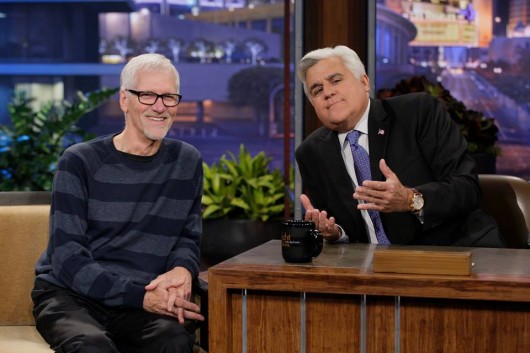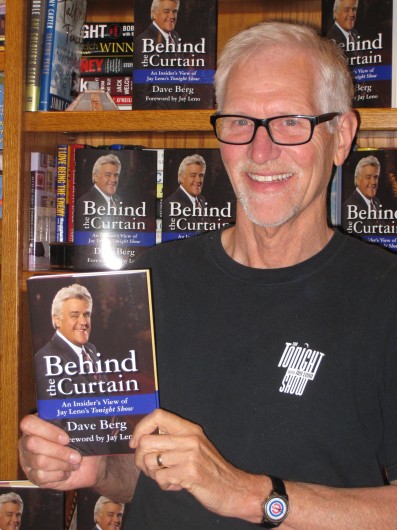
Dave Berg (left) sits at the desk with Jay Leno on ‘The Tonight Show with Jay Leno.’ Credit: Courtesy of Mary Berg
As co-producer of “The Tonight Show with Jay Leno” and “The Jay Leno Show” for a combined 18 years, Dave Berg helped shape late-night television with his experience in journalism by bringing in people from the political world, which ultimately contributed to one of the first environments where news and entertainment merged.
Berg came to Ohio State on Sept. 22 with his wife Mary, an OSU alumna, to speak about his experience with “The Tonight Show,” a period of time he also describes in his new book, “Behind the Curtain: An Insider’s View of Jay Leno’s Tonight Show.” He spoke to several journalism-related classes, including Comm 4202, a magazine-writing class taught by assistant clinical journalism professor Nicole Kraft, and Comm 2223, The Lantern practicum class taught by clinical assistant professor and director of student media Dan Caterinicchia.
In his speech to the classes, Berg touched on his background in journalism, notable experiences and how late-night television was the precursor to shows such as “The Daily Show,” where news and entertainment were coming to a lot of people from the same source, Kraft said. For instance, it was a shock to many people when actor Hugh Grant came on the show in 1995 and talked with Leno about how he was found with a prostitute.
“News wouldn’t have been broken that way when Jay Leno first did it,“ Kraft said. “He had the ability to instill a really important part of entertainment history into a very consumable form.”
Berg’s book was released in July, and he said its promotion is currently his priority. It took him roughly four years to put the book together and get it published, he said, but he wanted to take time to accurately tell the story of the show’s best and worst moments.
The book includes anecdotes about some of the show’s most well-known guests and gives an inside look on Leno’s work, which Berg said he wanted to highlight after Leno retired in February.
Berg’s predisposition to book prominent political figures seemed to make up for his lack of history in entertainment, with notable guest spots filled by Hillary Clinton, Joe Biden and Mitt Romney, among others. He said he wasn’t necessarily trying to do something different, but that it just made sense to push for guests he knew about.
“The interesting thing is that deep down inside, all political people want to be funny,” Berg said. “They’re kind of performers in their own right, and many of them understand how humor works.”
He noted that the worlds of Hollywood and Washington, D.C., are similar, and although the phrase “Washington is just Hollywood for ugly people,” is often attributed to Leno, Berg isn’t quite sure if it was he who actually coined it.
Leno’s show had some of the highest ratings in late-night television for nearly two decades, Berg said, because he and his team made efforts to appeal to the greatest quantity of people.

Dave Berg holds his book, ‘Behind the Curtain: An Insider’s View of Jay Leno’s “Tonight Show.”‘ Credit: Courtesy of Mary Berg
Mary Berg said because Dave was more conservative than his former colleagues, Leno would often refer to him to judge whether certain jokes had crossed the line.
Leno’s favorite guest was coincidentally Dave Berg’s favorite as well. This guest was someone whom many people considered to be “American royalty,” Dave Berg said. They promoted this icon as a “mystery guest” in 1998 because he didn’t want his name, John F. Kennedy Jr., released until the show aired.
“I thought, ‘Wow, this is a real human being, and (JFK Jr.) really is concerned and afraid of doing the segment,’” Dave Berg said. “I have never encountered a celebrity like that, who just didn’t think they were good enough, and he turned out to be the most charming, entertaining guest I’ve ever worked with.”
Dave Berg said he and JFK Jr. exchanged four total phone calls, each one lasting an hour, just to complete the pre-interview process, which was when Dave Berg guided booked guests in choosing and discussing topics for their segment with Leno.
One pivotal moment in the show’s life stood out not only for Dave Berg, but in the timeline of television history. That’s when Barack Obama was the first sitting president to ever appear on the late-night show, when he was interviewed by Jay Leno for a segment in 2009.
“I think Obama is probably better at humor than 90 percent of the Hollywood guests,” Dave Berg said. “And I’m not speaking ill of them at all, but he’s that good.”
After working around many celebrities, Berg said he doesn’t agree with the stereotypes about them having big egos or not caring about anyone but themselves. He said one of his biggest takeaways from the experience was learning that famous people are just that: people.
“Shows like TMZ are pretty popular today, and the way they portray celebrities and all the horrible things they do, but I happen to like most celebrities,” Dave Berg said. “Working with them changed me, not because they were high-powered, but just because it helped me to learn to be more sensitive to people. You had to learn to select your words carefully.”
Other than promoting his book, Berg — who currently lives in Valencia, Calif. — is signing a deal to be a weekly columnist for the Orange County Register. He’s written for publications such as USA Today, Reader’s Digest and The Washington Times, worked for National Public Radio and as a producer for “The O’Reilly Factor” with Bill O’Reilly, who also gave him a hand in pitching and promoting his book.
After Berg was let go at NBC in the 1980s, he decided to apply for the “The Tonight Show” last-minute and ended up asking for the application less than an hour before NBC stopped accepting them. He had no idea he would be picked for the job, but now he said he wishes he would have tried to enjoy the process more while he was in the middle of it.
“You get taken in by the details each day, like the ratings or what guest just canceled at the last minute,” he said. “There just aren’t that many openings for producers on late-night shows, and I’ve considered it a total blessing that I got that job.”


